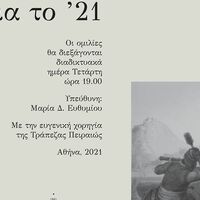The meaning of “death” in the Greek Revolution (1821–1832)
Item
Title
The meaning of “death” in the Greek Revolution (1821–1832)
Creator
Spatial Coverage
Relation
Subject - keywords
Date
7 April 2021
Abstract
"The spread of nationalism in the Greek lands marked the transition from patria (fatherland) to the nation and radically changed the perception of geographical space and the metaphysical meanings of life and death. Life and death (two divisive concepts) were secularised in the political thought of the modern Greek Enlightenment (with prominent figures Rigas Velestinlis, the anonymous author of the Hellenic Nomarchy and Adamantios Korais) and acquired political content. A life without national freedom, justice and political rights was now understood as 'death'. This new (secular) meaning is evident in the political texts of the Greek revolutionaries, especially those of the Third National Assembly of Troezen (1827).
The massacres of Greek Orthodox populations in Istanbul, Ayvalik, Chios, Messolongi, and elsewhere during the revolution played a key role in this process of reinterpretation.
In a dialectical relation to the vengeful fury of the Ottomans, the Greek revolutionaries showed that they were “determined either to liberate themselves and to gain our independence and to feel that we live as human beings or to perish”, as Ioannis Kolettis boldly stated in 1822. The change in mentalities became apparent during the third siege and the heroic exodus of Messolongi (10 April 1826), when, according to General Spyromilios, the 'holocaust of the city' of the Messolongi took place and 'so many humans' were lost."
(Edited and translated description from organiser’s website)
The massacres of Greek Orthodox populations in Istanbul, Ayvalik, Chios, Messolongi, and elsewhere during the revolution played a key role in this process of reinterpretation.
In a dialectical relation to the vengeful fury of the Ottomans, the Greek revolutionaries showed that they were “determined either to liberate themselves and to gain our independence and to feel that we live as human beings or to perish”, as Ioannis Kolettis boldly stated in 1822. The change in mentalities became apparent during the third siege and the heroic exodus of Messolongi (10 April 1826), when, according to General Spyromilios, the 'holocaust of the city' of the Messolongi took place and 'so many humans' were lost."
(Edited and translated description from organiser’s website)
Type specialization
Format
Data sets
Language
Bibliographic Citation
https://youtu.be/3Qld5vDVDmE
https://2021.uoa.gr/fileadmin/depts/uoa.gr/2021/uploads/Omilies_23421.pdf
https://2021.uoa.gr/anakoinoseis_kai_ekdiloseis/proboli_ekdilosis/21_omilies_gia_to_21/
Number Of Pages - Duration
01:00:00
Rights
BY-NC-SA Attribution-NonCommercial-ShareAlike
Position: 12397 (57 views)

